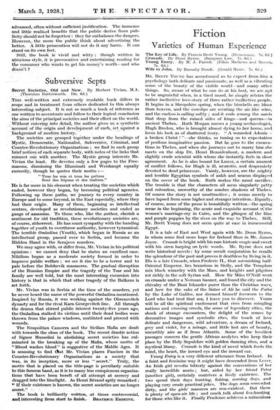Subversire Septs
Secret Societies, Old and New. By Herbert Vivian, M.A. (Thornton Thitterivorth. 10s. 6d.) Secret Societies, Old and New. By Herbert Vivian, M.A. (Thornton Thitterivorth. 10s. 6d.)
!Tilts well-written and extremely readable bqok differs in scope and in treatment from others dedicated to this always interesting. subject.. It is not so much ,a book of reference as . one written to accentuate and follow to their logical conclusion the aims-Of the principal societies and their effect on the world. Without entering .'into ,detail, the author gives us a synthetic account of the origin and development of each, set against a
background of modern history. _
. The societies _ are grouped together under the headings of lIfyttic, Democratic, Nationalist, Subversive, Criminal, and Ceunter-ReVolutientiry Organizations ; we find in each group brief notices of each separate body, with notes of the links that connect one with another. The Mystic group interests Mr. Vivian the least. He deVOtes only a few pages to the Free- masons, dismissing the Illuminati and Weishaupt equally cursorily, though he quotes their motto :- "Tons les role at thus lee pretres
Scat des fripons et des traitres."
lie is far more in his element when treating the societies which ended, however they began, by becoming political agencies. Following up these paths, we journey to every country in Europe and to some beyond, in the East especially, where they had their origin. Many of them, beginning as intellectual centres, developed as revolutionary societies and ended as gangs of assassins. To those_ who, like the, author, cherish a sentiment for Old tradition, these revolutionary societies are, of course, abhorrent. He has scant sympathy with the banding together of youth to overthrow authority, however tyrannical The terrible Omkidinct (Youth), which began in Russia as an intellectual group, passed over to Serbia, and became the Hidden Hand in the Serajevo murders.
We may agree with, or differ from, Mr. Vivian in his political opinions : we cannot deny that he states an excellent case. Nihilism began as a moderate society formed in order to improve public welfare ; we see it rise to be a terror and to pale before the Bolshevik massacres. The gradual disruption of the Russian Empire and the tragedy of the Tsar and his family are well told, but the most interesting excursion into history is that in which that other tragedy of the Balkans is set forth.
Mr. Vivian was in Serbia at the time of the murders, yet he never heard the name of the powerful Omladina mentioned. Inspired by Russia, it was working against the Obrenovitch dynasty and for the rival Kara Georgevitch line. All through the drama that stirred public interest twenty-five years ago, the Omladina stalked its victims until their dead bodies were thrown from the palace windows, mutilated and pierced with wounds.
The Neapolitan Camorra and the Sicilian Mafia are dealt with towards the close of the book. The recent drastic action of Signor Mussolini in abolishing secret societies has cul- minated in the breaking up of the Mafia, whose motto of "Blood washes blood" is suggestive of the Middle Ages. It is amusing to find that Mr. Vivian places Fascism in the Counter-Revolutionary Organizations as a society that was, in its inception, more or less " secret." Truly, the motto that is placed on the title-page is pecUliarly suitable to this famous band, as it is to many less conspicuous organiza- tions that have been bereft of all attempt at secrecy and dragged into the liinelight. As Henri l3eraud aptly remarked : " If their existence is known, the secret societies are no longer
secret." •






























































 Previous page
Previous page